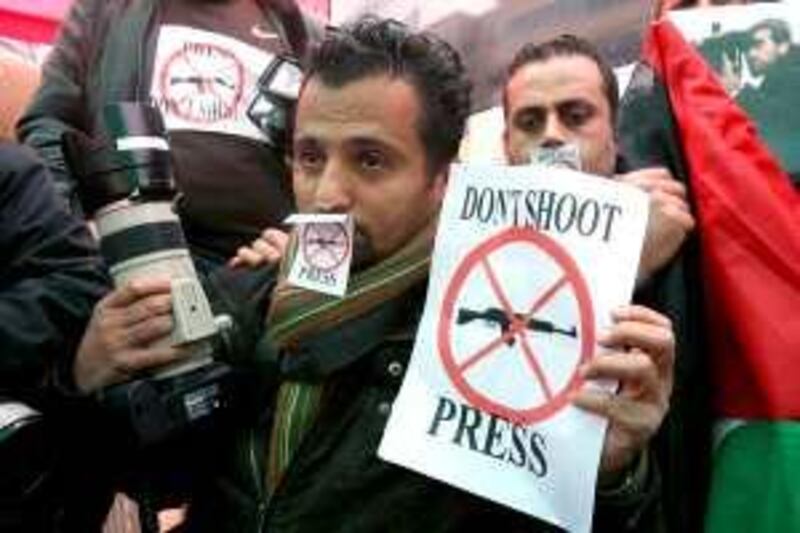RAMALLAH // Two Palestinian journalists from East Jerusalem accused of violating Israel's censorship laws have been jailed for two months, with the pair's supporters claiming they have been sent to prison because they worked for an Iranian television station. Khader Shaheen and Mohammad Sarhan, a reporter and producer respectively for Al Alam satellite network, Iran's Arabic language service, were found guilty of violating a military embargo on reports on the movement of troops immediately before the beginning of Israel's ground invasion of Gaza on Jan 3.
Israel rarely enforces its censorship laws, even if all accredited journalists sign a censorship form that in theory obligates them to clear any reporting on sensitive security matters through a military censor. Nevertheless, in the case against Shaheen and Sarhan, the Israeli chief censor, Sima Vaknin, decided to file charges after Shaheen, in response to a question from his anchor, had verified that Israeli troops were beginning to move towards Gaza.
The report was filed live an hour and a half before Israel's ground invasion of Gaza began and in spite of an embargo on any such reporting until after the ground invasion had in fact begun. David Derri, the lawyer representing the pair, said the fact that the two journalists were working for an Iranian media outlet had played some role in their prosecution. "The fact that they were reporting for an Iranian channel was another motivation for the state censor to pursue prosecution."
Reporters Without Borders condemned the verdict as a "political decision". "They are given two-month jail terms, just after Mahmound Ahmadinejad's re-election in Iran," a statement from the press freedom watchdog read. "Journalists should not be hostages to geopolitical developments." Fares Sarafandy, the Al Alam bureau chief in Ramallah, agreed with that assessment. "Khader and Mohammad were just doing their jobs," said Mr Sarafandy yesterday. They reported what they saw, namely that tanks were beginning to move. They didn't say the invasion had started. At heart, this issue is about Israel and Iran."
Mr Sarafandy also said the two had applied but had never received formal accreditation from Israel's government press office, and, as such, had never signed the censorship form and should not be bound by its strictures. Mr Derri said, however, that the law did apply to the two, even if they had not signed the form. In summing up the court ruling on Monday, the presiding judge wrote: "One does not need to be an expert or have great understanding in military history in order to know that the hour at which a military operation begins is of paramount importance".
But the fact that other journalists, including Israeli reporters, had filed similar stories in the hours before the ground invasion commenced has led some to suggest that this was less a case of breaching censorship laws than the fact that the two journalists worked for an Iranian TV channel. Mr Derri said he had presented the court with several instances of other reports, including from Israeli journalists, in which very similar wording was used to describe the events just before the ground invasion began. The court rejected those comparisons by suggesting that other journalists had couched their reporting in conjecture.
Mr Derri also said that censorship laws had been widely flouted during Israel's 2006 war on Lebanon and no journalist had been prosecuted. The court thus had no precedence for sentencing journalists just for violating the censorship law, and Mr Derri successfully argued that they had acted negligently rather than deliberately. "It's a very delicate line in this case." The court ultimately agreed to a plea bargain deal from the defence, resulting in the two-month sentence. Potentially, the journalists could have faced up to four years in jail.
Israel's treatment of journalists as well as censorship laws has come under increasing scrutiny in recent years, not least in the wake of the war on Gaza. During the Gaza onslaught, dozens of local journalists were wounded, including a reporter for Abu Dhabi TV who was injured when an Israeli shell struck a well-known media building in the heart of Gaza City. A Reuters cameraman was also wounded in that incident. The headquarters of Al Aqsa, the Hamas TV station in Gaza, was deliberately targeted and completely destroyed.
Moreover, Israel barred all journalists from entering Gaza, to wide condemnation media watchdogs. In its 2009 rankings, Freedom House relegated Israel from 30 to 31, largely as a result of that decision. Danny Seaman, the head of Israel's government press office, described the relegation by Freedom House as "ridiculous". If journalists had been allowed in, Mr Seaman told the Jerusalem Post in May, "their reports would have had a harsh effect on world public opinion and endangered our ability to meet our goals".
Reporters Without Borders has two rankings for Israel, one for its domestic press freedoms, in which the country ranks 46 out of 173 countries, and one for its "extraterritorial" areas, land it has occupied since 1967, where its comes in at 149. This low ranking was achieved not least because of the dozens of journalists killed in the occupied territories in recent years, including in 2008, when Fadel Shanaa, a Reuters cameraman, was killed by an Israeli tank shell.
Footage of the event, as well as testimony from witnesses and colleagues, showed Shanaa clearly next to his armoured car, also clearly identifiable as a media vehicle. The Israeli army, however, after a perfunctory inquiry, cleared soldiers of all responsibility for his death, eliciting vocal protests from journalists and the Foreign Press Association in Israel. This year alone, and not including the war on Gaza, seven journalists, six of them Palestinian, were injured by Israeli soldiers.
okarmi@thenational.ae





